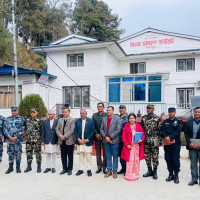- Friday, 27 February 2026
Dispute Over Lipulek
Time To Display Diplomatic Acumen
Nepal is now facing a diplomatic stand-off with India and China, its immediate two neighbours, over their recent deal to resume bilateral trade through Lipulek Pass, located in the far-western part of Nepal. Despite enjoying cordial relations with both neighbours, this dispute has resurfaced just days before Prime Minister KP Sharma Oli’s scheduled visit to China and India, impelling Nepal to demonstrate diplomatic acumen to defend territorial integrity and sovereignty.
Nepal has maintained close and friendly ties with both neighbours since ancient times. Nepal’s relations with India have often been described as ‘special’ as they share an open border, while Nepal-China ties were elevated to ‘strategic partnership.’ Now Lipulek issue poses a litmus test of friendship with them, as lofty rhetoric couched in sweet and mellifluous words hardly conceals the bitter facts and geopolitical interests.
The map of the 1816 Sugauli Treaty and documents released from 1827 to 1856 show that all the territories to the east of the Kali (Mahakali) River, including Limpiyadhura, Kalapani and Lipulek, fall on Nepali side.
The wounds of Lipulek hurt Nepalis time and again as the political leadership, since the end of the Anglo-Nepal war, has failed to reclaim the encroached territory. Nepal has been ignored by its giant neighbours when they enter into agreements to utilise the strategic territory for religious and trade purposes.
Fresh controversy
The latest controversy over Lipulek emerged after India and China inked an accord to reopen three traditional border trade routes, including Lipulek, on August 19 during Chinese Foreign Minister Wang Yi's visit to India. The Chinese FM, his Indian counterpart Dr. S. Jaishankar and National Security Advisor Ajit Doval reportedly held meetings before reaching the agreement. The growing Sino-India bonhomie was seen as a move to counter the hegemonic policies of US President Donald Trump, who has waged a trade war with many countries, including India and China. However, their deal on using Lipulek as a trade route triggered a backlash in Nepal, with a wave of protest from parliament to the streets.
On Thursday, Nepal’s Ministry of Foreign Affairs sent two separate diplomatic notes to India and China, objecting to their move to reopen the trade route via Lipulek Pass. The notes are based on its Wednesday statement and the past documents that substantiate that Lipulek belongs to Nepal, according to a media report. The Ministry has urged them to solve the dispute through the diplomatic channel. It has notified of the similar notes dispatched to the two nations in 2015 when India and China decided to undertake trade via Lipulek. The ministry has sought high-level engagement with India in solving the border dispute, while urging China to recognise Lipulek as Nepali territory.
In its statement, issued on Wednesday, the ministry reaffirmed that the official map of Nepal, as incorporated in the Constitution of Nepal, includes Limpiyadhura, Lipulek, and Kalapani as integral parts of Nepali territory. It has asked the Indian government not to carry out any activities such as road construction/expansion or border trade in that area. The government has expressed commitment to resolving the border issues between the two countries based on historical treaties and agreements, facts, maps, and evidences, in keeping with the spirit and sentiment of the close and friendly relations that have existed between them. In May 2020, Nepal expressed regret when India’s Defence Minister Rajnath Singh inaugurated a ‘link road’ to Lipulek.
Countering Nepal’s position, spokesperson for India’s Ministry of External Affairs Randhir Jaiswal said that the claims were “neither justified nor based on historical facts and evidence.” Stating that Nepal’s territorial claim is untenable, he argued that border trade between India and China through Lipulek pass commenced in 1954 and has been going on for decades. Once India had termed Limpiyadhura, Lipulek and Kalapani as ‘disputed territories’, but the latest statement shows it has hardened its position on them, which might dent any diplomatic effort to settle the matter in Nepal’s favour.
The Lipulek saga has once again cropped up to test Nepalis’ loyalty to their motherland. The government, lawmakers, political parties, civil society and the media fraternity have joined forces to restore Nepal’s right to its encroached territory. This is indeed positive that they have shown solidarity at the critical moment, setting aside all their differences. They have urged both neighbours to respect Nepal’s sovereignty and sensitivity. The other day, the government spokesperson and Minister for Communication and Information Technology Prithvi Subba Gurung said that Lipulek is Nepali territory and Nepal has not backed down from its claim over it.
Diplomatic opportunity
Prime Minister Oli is set to visit China to attend the Shanghai Cooperation Organisation (SCO) summit at the end of this month. There, he will have an opportunity to put forth Nepal’s territorial concerns with Chinese President Xi Jinping and Indian Prime Minister Narendra Modi. Of course, building trust at the highest political level is the first step towards sorting out bilateral issues, no matter how tricky they are.
Meanwhile, during his visit to Pakistan, Chinese Foreign Minister Wang Yi said that the 19 August consensus with India is not against any third party. Wang’s declaration can be a basis for Nepal to pursue diplomacy with China in establishing a legitimate claim over Lipulek.
Nepal’s weak diplomacy is also attributed to repeated deals reached by India and China on reopening the trade route via Lipulek. However, the two neighbours should consider Nepal’s geostrategic location seriously.
(The author is Deputy Executive Editor of this daily.)
















